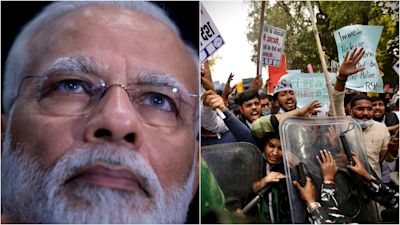India cracks down on demonstrators, media and critics ahead of weekend's farmers' protest

Video report by ITV News Correspondent Dan Rivers
India's government has been accused of cracking down on free speech ahead of another farmers' protest this weekend.
Farmers have been camping out at the edges of the capital, ready to demonstrate against new agricultural laws for the umpteenth time in just over two months.
In an attempt to stop them from marching into the city, the authorities have employed concrete barricades, concertina wires and upturned beds of nails. Several protesters have spoken out about the poor conditions at the site.
Media platforms, dissenters and activists have also come under unprecedented attacks from Prime Minister Narendra Modi’s nationalist Bharatiya Janata Party.
Hundreds of Indian Twitter accounts, including those of news websites, activists and a farmers’ union, were suspended on Monday. Some have since been restored.
Meanwhile, at least nine journalists have been charged in the last few weeks for reporting on the demonstrations.
Randir Singh recently flew back home to Britain from the protest sites. He's involved with charities Khalsa Aid and Midland Langar Seva Society - he's the CEO of the latter. Whilst in India, he supported the protesters by delivering food and other supplies.
"The internet has been cut off, the water supplies have been switched off, the electrics have been switched off and there's been a media blackout," Randhir said.
"The reason there's been a media blackout is so no one out here know what's happening."
Briton Randir Singh, who has witnessed the rallies, said he has come across protesters from various generations
The clampdown followed the death of a protester, Navneet Singh, on January 26. The largely peaceful rallies had turned violent after a group of farmers veered from an agreed protest route and stormed New Delhi’s 17th century Red Fort. Hundreds of police and farmers were injured in clashes.
The demonstration's leaders condemned the violence but refused to call off the protest.
Authorities claimed no shots were fired and that Singh died because his tractor overturned. However, his family say he was shot dead. Several publications published their allegation.
Ministers in Modi’s government accused the journalists and a prominent opposition parliamentarian of inciting hatred and endangering the nation’s integrity through inaccurate reporting and tweets. Consequently, colonial-era sedition charges. which carry a maximum five-year prison term, have been filed.
"It's very heartbreaking," Randhir Singh said.
"All they want is their livelihood back. There is trouble happening with a small minority of people that are against it, but the majority of people are just peacefully protesting.
"Until now, they claim 160 [protestors] have lost lives, from suicide, from illnesses, the government need to sit around and come to a solution asap."
Mr Singh says the BJP's response to the protests are "heartbreaking"
Media watchdogs and rights groups, including Human Rights Watch, condemned the government’s actions as censorship. The Editors Guild of India said the cases against journalists were “an attempt to intimidate, harass, browbeat, and stifle the media.”
Twitter’s reaction of suspending accounts has also been criticised.
India’s Ministry of Electronics and Information Technology wrote to Twitter on Monday, directing the company to take down accounts that had used incendiary hashtags during the January 26 clashes.
The ministry did not respond to calls and emails but issued another statement Wednesday, accusing Twitter of “unilaterally” restoring the accounts “despite orders to withhold them.”
It said the platform had to adhere to the authorities’ directions and may face criminal charges “for not complying with government orders.”
Twitter declined to comment.
The government’s response to the farmers' protests has gone beyond India’s borders.
On Wednesday, India’s Ministry of External Affairs condemned “vested interest groups trying to enforce their agenda” after pop star Rihanna and teenage climate activist Greta Thunberg tweeted in support of the protests.